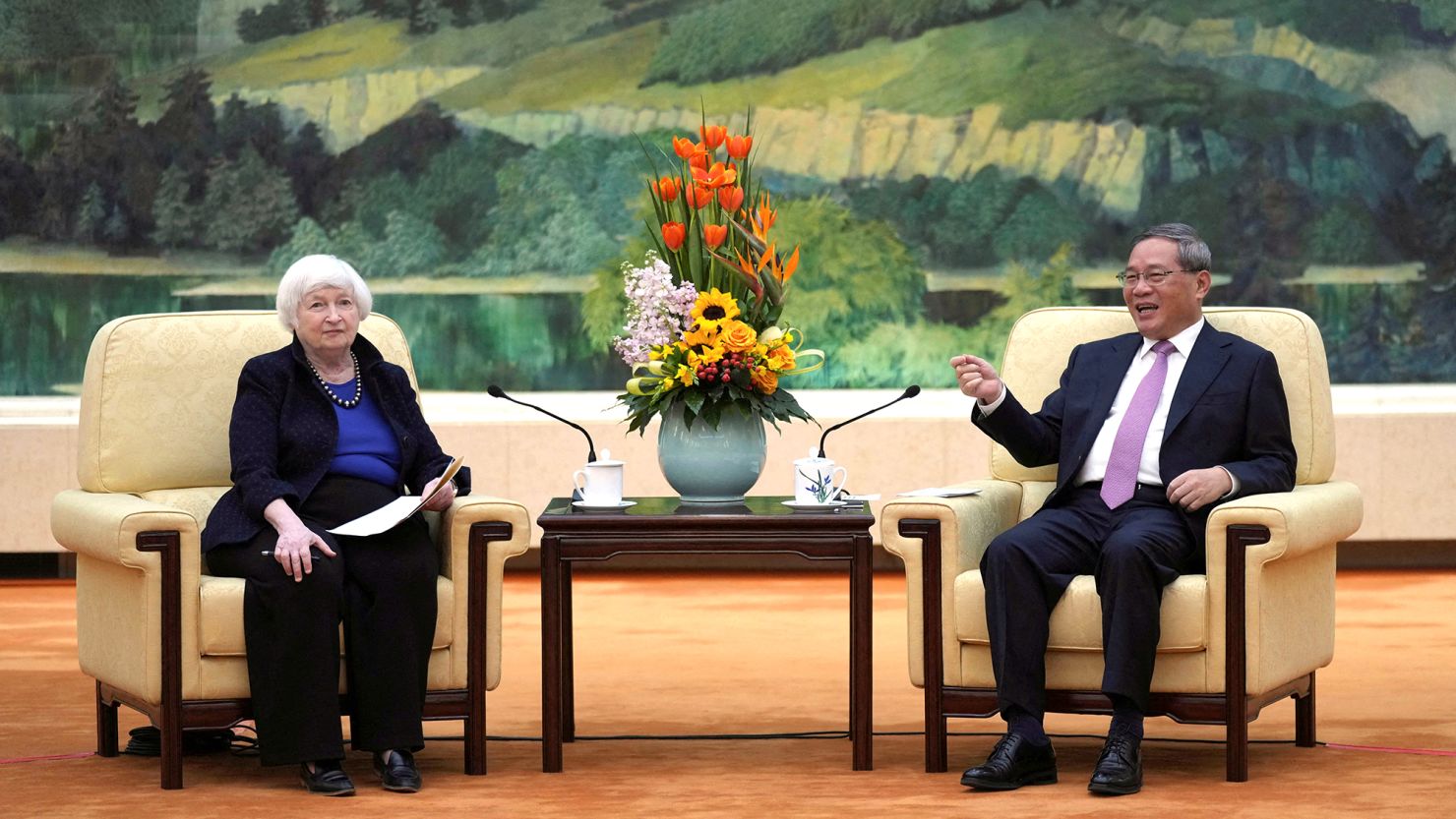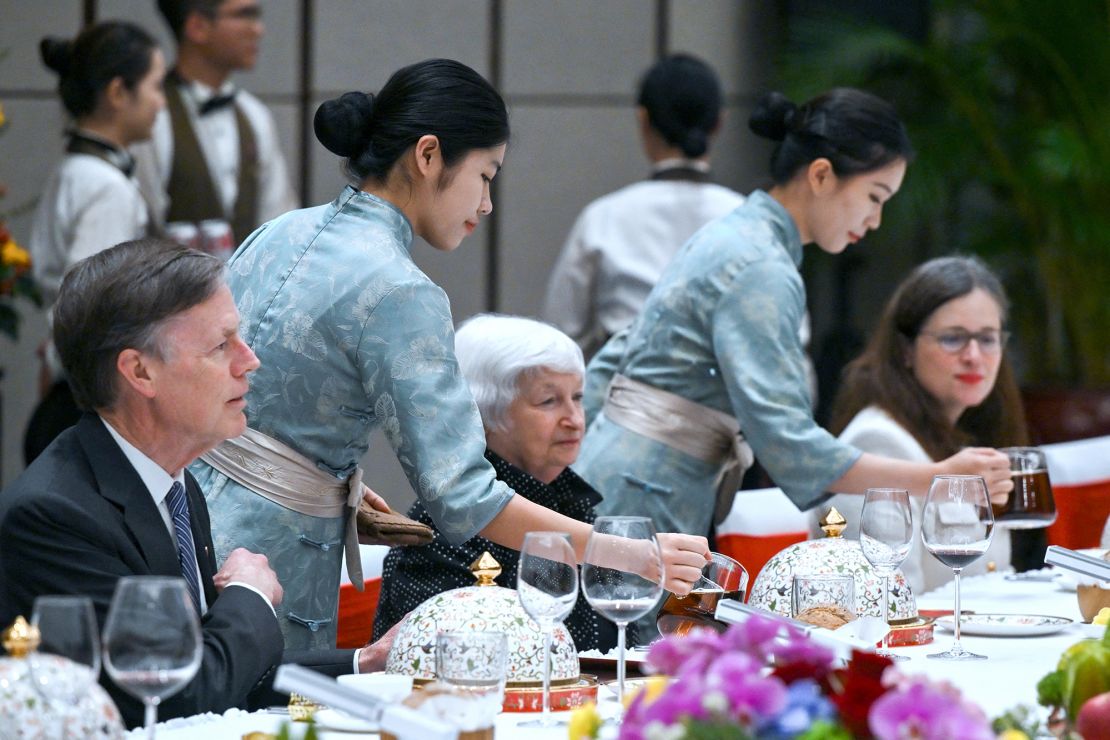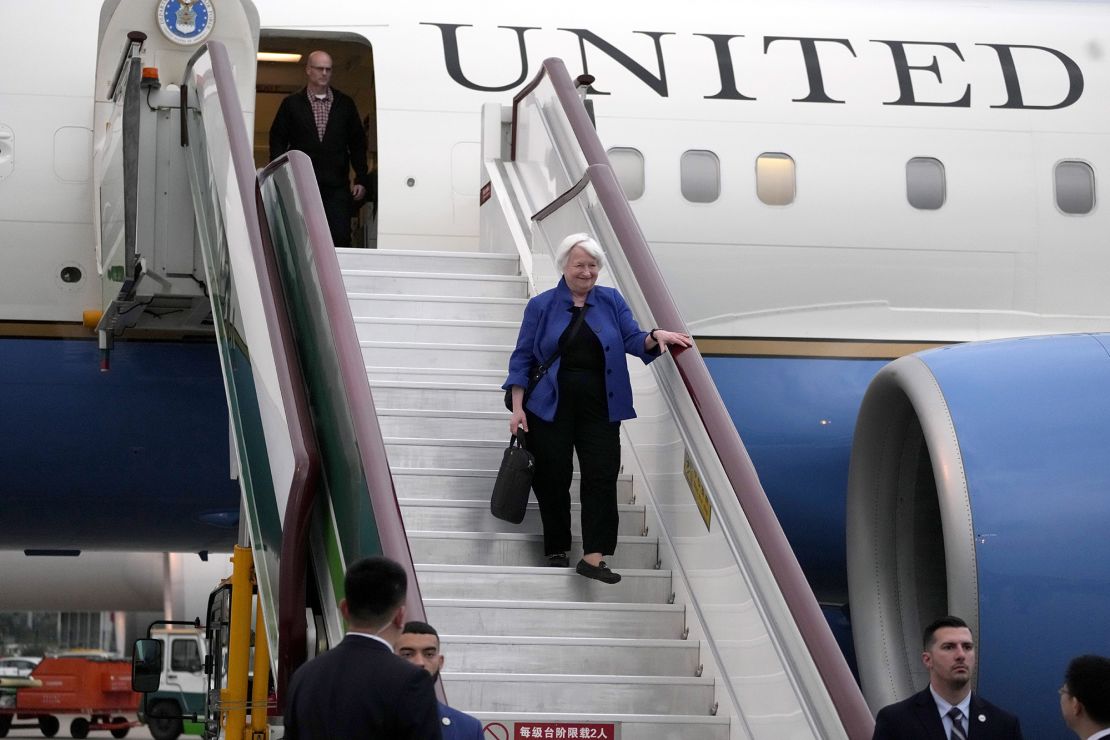
In Short
- Yellen expressed US concerns about Chinese overproduction during her visit.
- Her trip aimed to address growing trade disputes between the US and China.
- Yellen cautioned against Chinese backing of Russia amid tensions over Ukraine.
- She emphasized the importance of maintaining open channels of communication between the US and China to manage competition and prevent conflict.
- Yellen’s practical approach and chopstick abilities made waves on Chinese social media, highlighting the complexities of US-China relations.
TFD – Delve into the key takeaways from US Treasury Secretary Janet Yellen’s recent visit to China, where economic concerns, bilateral relations, and discussions on Chinese overproduction took center stage. Gain valuable insights into the implications for US-China ties and the broader global economic landscape from this significant diplomatic engagement.
As she concludes her second trip to China, US Treasury Secretary Janet Yellen expressed US concerns about Chinese overproduction, cautioned against backing Russia, and, perhaps surprisingly, made a sensation on Chinese social media with her travel attire and chopstick abilities.
Over the course of four days, Yellen visited with a wide range of Chinese authorities, professors, students, and American executives in Beijing, the nation’s capital, as well as in the southern city of Guangzhou.
The goal of the visit, which is her second to China as Treasury Chief in nine months, is to address the growing trade disputes between the two largest economies in the world as they attempt to mend fences after a summit between Chinese leader Xi Jinping and US President Joe Biden in November.
Yellen delivered a strong warning to Beijing despite the generally upbeat tone of Chinese official media coverage: China’s rapidly increasing exports of state-subsidized solar panels, batteries, and EVs are endangering American jobs and businesses and need to be curbed.
Yellen stated at a press conference on Monday that she had warned senior Chinese officials about certain aspects of the Chinese economy that were having “growing negative spillovers” on the US and the rest of the globe.
“I am especially concerned about how China’s persistent macroeconomic imbalances—that is, its low household consumption and excessive corporate investment, which are made worse by extensive government support in particular industrial sectors—will put workers and companies in the United States and around the world at serious risk,” she said reporters.
These are her trip’s four main lessons learned:

Overcapacity is an issue.
Prior to the US presidential election in November, China’s overcapacity in important industries like solar energy and electric vehicles (EVs) has become a major source of dispute both internationally and domestically.
It was Yellen’s trip’s main objective as well. She has repeatedly relayed the message to Chinese officials from Vice-Premier He Lifeng, known as the country’s economic tsar, to Premier Li Qiang.
Yellen told reporters on Monday that “China is now simply too large for the rest of the world to absorb this enormous capacity.” “The PRC’s actions today have the power to change global prices. Additionally, the viability of American and other international businesses is called into doubt when China’s artificially low-cost products flood the global market.
However, there are few indications that Beijing will change its economic stance.
In his meeting with Yellen on Sunday, Li, the Chinese premier, urged Washington not to “politicize” economic and trade issues or “overstretch the concept of national security,” but to adhere to “the basic market economy norms of fair competition and open cooperation.”
According to a readout from China’s Foreign Ministry, Li urged Yellen, “The United States should look at the capacity issue objectively and dialectically from the perspective of market economy and a global vision.”
Beijing recognized the overcapacity issue in the nation as a major challenge during the annual economic work conference in December, indicating that it is aware of the situation.
However, editorials in a number of Chinese state media sources this month contested the idea that other economies are in danger due to China’s excess production. According to the Xinhua news agency, “What China exports is advanced production capacity that meets the needs of foreign customers.”
“The exchanges that we announced during this trip will provide a dedicated structure for us to raise our concerns about China’s imbalances and overcapacity — among a wide range of other topics — in a detailed and targeted manner,” Yellen said at the news conference, acknowledging that worries about Chinese oversupply would not be resolved in a week or a month.
2. Refuse to back Russia
According to a readout from the Treasury Department, Yellen cautioned Chinese corporations that they could suffer “significant consequences” if they give material support for Russia’s war on Ukraine during a meeting with He, the economic tsar, in Guangzhou.
After Russia invaded Ukraine, the United States and its allies applied trade sanctions and other trade restrictions to stifle the Kremlin’s war effort. As a result, China emerged as a crucial economic lifeline for Russia. In addition to declaring its neutrality and advocating for peace in the war, Beijing has strengthened its diplomatic, military, and economic connections with its neighbor while avoiding denouncing Russia’s actions.
According to US intelligence, China is giving Russia weaponry and technology that is crucial to Moscow’s conflict in Ukraine. Due to their violation of US sanctions, Chinese enterprises now face trade restrictions from the Biden administration.
Yellen stated on Monday that she had “difficult conversations” with Chinese officials regarding security issues at home.
“President Biden and I are committed to exerting every effort to halt the supply of materials that bolster Russia’s defense industrial base and facilitate its aggression against Ukraine,” the speaker declared. “We remained concerned about the part that any companies—including those in the PRC—are playing in Russia’s acquisition of military hardware.”
“I also reinforced that any banks that facilitate significant transactions that channel military or dual-use goods to Russia’s defense industrial base expose themselves to the risk of U.S. sanctions,” she added.
China’s Foreign Ministry stated that “normal cooperation in various fields between China and Russia should not be interfered with or restricted” in response to a question regarding Yellen’s remarks made during a news conference on Monday.
According to ministry spokesman Mao Ning, “Relevant countries should not attack and discredit China’s normal state-to-state relations, and should not harm the legitimate rights and interests of China and Chinese companies.”
3. It’s critical to continue speaking
Following a low point in bilateral relations early in the year, Yellen’s visit is a part of Washington’s efforts to keep frequent, open channels of communication open with Beijing in order to manage competition and avert unintentional conflict.
Her visit also occurred a few days after Biden and Xi had their first phone chat of the year, which was their first since their November in-person summit in San Francisco.
Yellen declared on Monday that “it is undeniable that the US-China relationship is on stronger footing today than this time last year.” “And we have been able to build on that foundation throughout this trip to advance specific issues that are important to Americans.”
However, she cautioned that this does not imply that all of the issues between the two powers have been settled.
“President Biden and I recognize the complexity of our relationship with clarity. Our top goals include defending our country’s security as well as those of our friends, working toward a positive economic partnership that provides fair opportunities for American businesses and people, and collaborating with China where necessary and feasible.
Yellen also met with China-based American executives and relayed their concerns about doing business in the country to Chinese officials, particularly after the raids by Chinese authorities on consulting firms last year.
“On each side, we need to be as transparent as we can about our national security concerns and how the actions we take will lead to resolving those concerns,” Yellen said on Monday in response to a question by CNN’s Marc Stewart.
“When we’ve put restrictions in place, we’ve proposed rules, gone through a full rulemaking process in which we take comments and make very clear what the rules of the game are. Additionally, I believe that would benefit the Chinese side as well.

4. You may make friends with chopsticks
Even though Yellen occasionally spoke harshly, she was welcomed with remarkable warmth in China, particularly on social media, where anti-American sentiment has been on the rise recently.
A portion of it is due to her personal taste, which includes her alleged fondness for Chinese cuisine. Following the discovery that members of her team were dining at a Yunnan restaurant chain, Yellen’s business there saw a sharp uptick during her most recent visit to Beijing.
Chinese social media users were drawn to Yellen as soon as she stepped off the plane in Guangzhou on Thursday afternoon, Thursday afternoon, and carried a simple cross-body bag along with her briefcase.
Her practical approach was praised by internet commentators, who also likened her to a Beijing “dama,” a middle-aged Chinese woman.
“Yellen arrived like any other tourist. She got off the plane alone, had a bag slung across her body and a handbag in her hand. To be honest, as a senior official, she is so down-to-earth!” a comment said on Weibo, a popular social platform.
“What’s in her bags is irrelevant. Another comment said, “The important thing is she didn’t have to show off (her power) and didn’t need a whole entourage crowding over her.”
Chinese politicians typically travel with a large number of personal helpers who carry their baggage and occasionally provide shade in the form of umbrellas when they are outside.
Online commentators also marveled at Yellen’s dexterity with chopsticks, after a Weibo account affiliated with state broadcaster CCTV released a short video showing her dining at a Cantonese restaurant in Guangzhou.
Nearly 150 years have passed since Tao Tao Ju first opened its doors. Yellen served roasted geese, sweet and sour pork, and stir-fried beef noodles as main courses in addition to traditional dim sum favorites like egg tarts, shrimp dumplings, and pan-fried turnip cakes.
The CCTV reporter commented, “(I) noticed Yellen uses chopsticks quite well,” in the post. Yellen has to know more about China than merely its cuisine in her capacity as a US official. She can only rectify the US worldview and its perceptions of China and China-US ties by getting a deeper grasp of China.
Conclusion
US Treasury Secretary Janet Yellen’s visit to China underscored the ongoing economic concerns and trade disputes between the two nations. Her discussions on Chinese overproduction and caution against backing Russia reflect the complex dynamics of US-China relations. As both countries navigate challenges and seek cooperation, maintaining open communication channels remains crucial for managing competition and promoting mutual understanding. Yellen’s trip serves as a reminder of the intricate balance required in international diplomacy and economic relations.
Connect with us for the Latest, Current, and Breaking News news updates and videos from thefoxdaily.com. The most recent news in the United States, around the world , in business, opinion, technology, politics, and sports, follow Thefoxdaily on X, Facebook, and Instagram .
